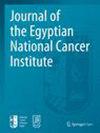REC8 regulates neuroblastoma cell proliferation, migration, invasion, and angiogenesis via STAT3/VEGF signaling
IF 2.1
Q3 ONCOLOGY
Journal of the Egyptian National Cancer Institute
Pub Date : 2023-12-18
DOI:10.1186/s43046-023-00197-w
引用次数: 0
Abstract
Neuroblastoma, one of the most prevalent childhood cancers, is often treated with surgery, radiation, and chemotherapy. However, prognosis and survival are still dismal for children with neuroblastoma at high risk. Consequently, it is vital to identify new and effective treatment targets. As a component of the meiotic cohesion complex, REC8 is involved in a wide range of malignancies. The current work assessed the impact of REC8 knockdown on SH-SY5Y and SK-N-AS neuroblastoma cells and delved into the molecular mechanism behind this effect. Knockdown of REC8 using the small interfering (si) RNA technology, and the results were verified by quantitative reverse transcriptase polymerase chain reaction (qRT-PCR) and western blot. The Cell Counting Kit-8 (CCK-8) was used to examine cell proliferation, while flow cytometry was used to examine cell cycle progression and apoptosis. Analyses of angiogenesis included tube formation experiments. Transwell tests were used to examine cell migration and invasion. The data showed that downregulation of the REC8 led to a substantial decrease in cell proliferation by stopping the cell cycle in the G1 phase. REC8 knockdown significantly reduced neuroblastoma cell proliferation, migration, invasion, angiogenesis, induced cell cycle arrest, and enhanced apoptosis. We also discovered that repressing REC8 expression in neuroblastoma cell lines SH-SY5Y and SK-N-AS reduced their ability to activate the STAT3/VEGF signaling pathway. Neuroblastoma therapy may benefit from targeting REC8 and its downstream targets.REC8 通过 STAT3/VEGF 信号调控神经母细胞瘤细胞的增殖、迁移、侵袭和血管生成
神经母细胞瘤是最常见的儿童癌症之一,通常采用手术、放疗和化疗进行治疗。然而,神经母细胞瘤高危儿童的预后和存活率仍然不容乐观。因此,确定新的有效治疗靶点至关重要。作为减数分裂凝聚复合体的一个组成部分,REC8与多种恶性肿瘤有关。目前的研究评估了REC8敲除对SH-SY5Y和SK-N-AS神经母细胞瘤细胞的影响,并深入研究了这种影响背后的分子机制。采用小干扰(si)RNA技术敲除REC8,并通过定量逆转录酶聚合酶链反应(qRT-PCR)和免疫印迹验证结果。细胞计数试剂盒-8(CCK-8)用于检测细胞增殖,流式细胞术用于检测细胞周期进展和细胞凋亡。血管生成分析包括管形成实验。Transwell 试验用于检测细胞迁移和侵袭。数据显示,下调REC8会使细胞周期停止在G1期,从而导致细胞增殖大幅减少。REC8 基因敲除能显著减少神经母细胞瘤细胞的增殖、迁移、侵袭和血管生成,诱导细胞周期停滞,并增强细胞凋亡。我们还发现,抑制 REC8 在神经母细胞瘤细胞系 SH-SY5Y 和 SK-N-AS 中的表达会降低它们激活 STAT3/VEGF 信号通路的能力。神经母细胞瘤治疗可能会受益于靶向 REC8 及其下游靶点。
本文章由计算机程序翻译,如有差异,请以英文原文为准。
求助全文
约1分钟内获得全文
求助全文
来源期刊
CiteScore
3.50
自引率
0.00%
发文量
46
审稿时长
11 weeks
期刊介绍:
As the official publication of the National Cancer Institute, Cairo University, the Journal of the Egyptian National Cancer Institute (JENCI) is an open access peer-reviewed journal that publishes on the latest innovations in oncology and thereby, providing academics and clinicians a leading research platform. JENCI welcomes submissions pertaining to all fields of basic, applied and clinical cancer research. Main topics of interest include: local and systemic anticancer therapy (with specific interest on applied cancer research from developing countries); experimental oncology; early cancer detection; randomized trials (including negatives ones); and key emerging fields of personalized medicine, such as molecular pathology, bioinformatics, and biotechnologies.

 求助内容:
求助内容: 应助结果提醒方式:
应助结果提醒方式:


